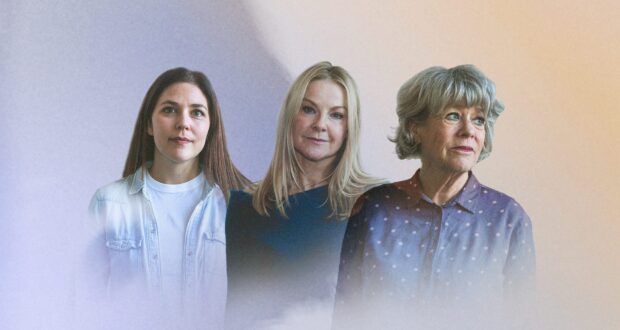Thoughtful and well written, humorous and moving, Broken Water effectively expresses the dilemma of motherhood forever experienced by women: endless judgement made endurable by female solidarity. Summary
Rating
Good
A looped soundtrack of audio is barely discernible over the audience chatter as we wait for the play to begin. What is clear, however, is the repeated reference to children’s milestones within the played speeches, and how a mother’s voice breaks through to question: what is the point of my life?
The three actors enter, seating themselves in age range, eldest first, in a diagonal formation. Other than themselves, the stage remains bare for most of the performance with lighting focused strictly on the speaker: simple but effective. The individual monologues do not need any embellishment to deliver forceful emotion.
It becomes obvious quite quickly that the title of Broken Water refers to that stage of birth when a women’s waters (sometimes!) breaks, as all three women discuss, in some detail, the ways in which this has happened to them, or to others. With humour and candidness. It is sufficiently real to garner facial expressions of support from many members of the audience. However, the title also serves as a metaphor for the new reality that every new mother has to charter, which is exhausting, alienating, frightening, boring and, no matter how much preparation you do, completely unexpected.
What follows is an honest and realistic account of the journey that each of these women experience in relation to motherhood throughout the stages of their life and the lives of their children. Ground breaking it is not, but it is delivered well and is sufficiently realistic and relatable to generate empathy from the audience, as well as occasional shock. All the actors breathe life into their roles, but it is Sarah Hadland as Philipa that shines as she seamlessly moves through the various stages of her life, evoking sympathy and frustration in equal measures. Similarly, Rosemary Ashe as Olive is outstanding in moments when she reenacts violation and embarrassment, grief and isolation.
Olive is in her 70s. She gave birth the first time when she was barely more than a child herself. The conception a result of rape, she was forced to give the baby away by her mother. A subsequent child followed as a result of a less than happy marriage, but grief lies in her heart. Philipa is a fifty-something divorcee whose children are leaving the nest. Having once had a successful career she has been out of work for too long and is unable to find employment. Linda (Naomi Petersen), in her thirties and desperate for a baby, appears to be unable to conceive, but lives with the constant judgment and misconceptions of others. We follow their stories individually, simultaneously moved and amused, until the narrative completes a neat trajectory and the stories from the three entwine at the end where their collective support for each other is reinforced, along with the commonality of experience.
The recurring themes in this play are not original but remain current. Indeed the frustration experienced as a member of the audience is that women are still in this situation: isolated, judged, marginalised. And yet, their collective resilience, support and dark humour gives us hope.
Written by: Michèle Winstanley
Directed by: Nicola Samer
Broken Water plays at the Arcola Theatre, Hackney until 24th February 2024. Further information and booking can be found here.
 Everything Theatre Reviews, interviews and news for theatre lovers, London and beyond
Everything Theatre Reviews, interviews and news for theatre lovers, London and beyond



